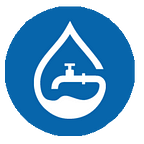www.watersecuritysystem.com
Individual Efforts Matter. Every Drop Matters.
The impact of individual consumption and leaks on overall water demand in Florida.
During Miami’s rainy season, it’s important for us to remember that all this rain has a purpose. Over 75% of the water we use in Florida and nearly 90% of the water we drink comes from our aquifers — aka ‘underground mountains’ — which are replenished by rain. There are two of these in Florida; the first — the Biscayne aquifer — is a shallow coastal basin located under Miami measuring approximately 4,000 square miles, and the second — the Floridan aquifer system, consisting of the Upper and Lower Floridan aquifers — is deeper underground and covers the whole state. Water from the latter is generally too saline for humans to consume without treatment, making the Biscayne aquifer Florida’s main source of water. Because of its proximity to the surface, the Biscayne aquifer offers cheap access to freshwater, but it also requires careful management to balance the excess or lack of rainfall throughout the year.
Proper management of Miami’s water resources has become increasingly important in recent years, as the city’s growth has increased water demand, and the construction of concrete buildings has reduced the ground’s capacity to absorb rainfall and replenish the aquifer. The consequences of this impermeabilization of the Biscayne water table through concrete cover exacerbates the risk of saltwater intrusion and contamination, which can make the aquifer’s water unfit for human consumption.
Water scarcity and contamination are significant issues not just because we rely on the Biscayne for our freshwater needs, but also because water is central to most of Florida’s activities. Water is the basis of our renowned Biscayne Bay and Everglades natural landscapes, and is essential for watering our crops and lawns, generating electricity, and fulfilling our business and consumption needs.
In the State of Florida, the southern region is home to 41% of the total population, and accounts for almost half of all freshwater and saline water withdrawals. Most of this water is used for public supply, which we each pay for through our utility bills.
South Florida Water Consumption — Percentage share per sector
It is interesting to note that since the year 2000, freshwater withdrawals in southern Florida have been moving in the opposite direction to population growth, thanks to the South Florida Water Management District (SFWMD)’s programs which encourage the use of alternative water sources, such as reclaimed wastewater. Increasing water resources in this way has reduced freshwater extractions for drinking water by as much as 37 gallons per day across the region. Other measures implemented include water conservation and the promotion of water efficient appliances and water efficiency devices. All together, these simple actions can make a considerable contribution to ensuring water supply in the region. In total, these initiatives have reduced the water used by southern Florida’s 9 million residents from nearly 180 gallons of water per person per day in 2000, to roughly 128 gallons in 2020.
However, whilst these are significant savings, their contribution to Florida’s water supply are greatly reduced by persisting inefficiencies, especially water leakage. According to the US Environmental Protection Agency (EPA), the average household loses 9,400 gallons of water annually from leakage alone. For the over 833 thousand households of Miami-Dade County, these losses equal nearly 8 billion gallons, or 12 thousand Olympic swimming pools annually.
Water leakage impacts our environment, our bills and even our safety — as we have recently seen with the collapse of the condo in Miami, which was due to the corrosion of its structure from long-term water leakage.
Water leak protection systems can increase water conservation and security by detecting and automatically stopping leaks, either by sending alarms and notifications (passive systems) or by shutting off the water supply immediately (active systems). Water Security System has been working with Miami’s residents for over a decade to reduce the Olympic daily leakage. Using the latest technological advances in the field, Water Security System has been working with commercial, industrial and residential users, as well as public utilities to prevent catastrophic flooding and damage, whilst mitigating the expenses of water leakage.
Water conservation efforts can help protect Florida’s water resources and the wellbeing of its residents, and this is where individual efforts can make the biggest impact. As well as switching off our taps and using water more efficiently (such as running fully-loaded dishwashers), preventing household water leakage is a crucial part of water conservation.
Our Water Security Systems have multiple applications to help you prevent and manage water leakage. Whilst more than one system may fit your property, certain systems can provide distinctive functions to address your needs. Contact us today to find out about how our technology can support your water conservation.
About Us | Our Products | Contact Us | LinkedIn | Instagram
